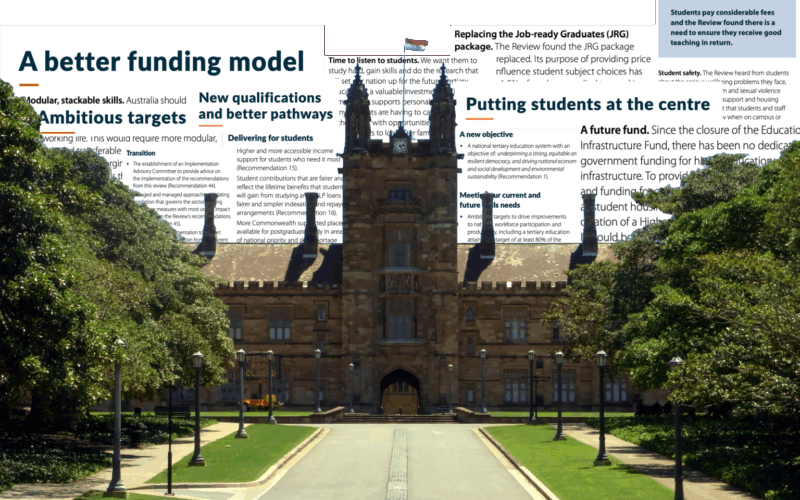Industrial scale wage theft is happening in Australia’s public universities, while Big 4 consultants rake in massive fees to prop up poor management. James Guthrie and Adam Lucas with the story.
A $400m scandal affecting almost every public university in the country reveals a dysfunctional system hollowed out by corporate ideology and managerial impunity.
Over the past decade, at least 28 universities have been caught systematically underpaying staff, casuals, fixed-term employees, and even those made ‘voluntarily’ redundant. The Fair Work Ombudsman has already
clawed back more than $218m for over 110,000 workers.
However, that is just the beginning.
These are not marginal payroll oversights. They are deliberate, industrial-scale acts of underpayment, driven by a business model that treats education as a revenue stream and staff as expendable costs. Furthermore, while thousands of academics and professional staff have gone without wages they were legally owed, university executives have been busy awarding themselves million-dollar salaries and pouring billions into property developments and cash investments.
The wrong priorities
Paying staff correctly should have been the first and most basic obligation of university leadership. But instead of prioritising wages for the people who teach students and produce research, senior administrators have funnelled public money into vanity projects, speculative real estate, and bloated executive teams.
At the University of Melbourne, $72m was returned to over 25,000 underpaid staff. At UNSW, wage theft liabilities hit $70.8m. The University of Sydney owed $23m; Monash another $18m. The University of Wollongong had to repay $6.6m to casuals and was slapped with a ‘contrition payment’ for good measure.
The excuses? Faulty systems. Confusing awards. ‘Unintentional’ errors. Such claims fall apart under scrutiny. Underpayments have stemmed from a range of shonky practices: flawed benchmarks for teaching and marking, casual staff denied minimum shift lengths, unpaid overtime, and word-per-hour metrics that do not pass the laugh test, let alone Fair Work standards.
Enter the Big 4
What is more, the very firms meant to hold the system accountable – consultancies like PwC, KPMG, Deloitte, and EY – have made themselves indispensable to university governance and administration. They recommend restructures, redesign staffing models, and then get paid again to audit their own handiwork.
Some even advised on the payroll systems that facilitated underpayments. They are not just consultants,
they are co-architects and enablers of a rotten system they helped create.
We have estimated that Australia’s 38 public universities are currently spending hundreds of millions a year on consultants while sitting on multi-billion-dollar investment portfolios and raking in international student revenue.
Big assets
A recent audit of Australian universities’ finances by Professor John H. Howard revealed they held $110.8B in total assets and $74.2B billion in net assets in 2023, including $6.1 billion in cash and cash equivalents. Yet these same universities have over the last five years cut more than 35,000 jobs and hundreds of subjects, dozens of courses and countless schools and disciplines.
Throughout this orgy of destruction, not a single vice-chancellor has lost their job over wage theft or any of the many other dubious activities in which they’ve been involved.
Governments, for their part, have done very little to rein in this behaviour. The bipartisan protection racket, whether under Labor or the Coalition, has shielded university executives and their corporate advisors from serious scrutiny. No forensic accounting. No royal commissions. No criminal investigations. Just token audits and polite nudges to ‘do better’.
Universities Accord
Even the Universities Accord, a document so risk-averse that a committee of consultants could have written it, admitted that wage theft was a serious problem. Nevertheless, it treated it as an unfortunate glitch rather than the logical endpoint of a system built to extract more from staff while giving them less. Wage theft is not a bug in the system,
it is the inevitable outcome of a system completely lacking in transparency and accountability.
Wage theft is a moral and political betrayal of public universities that were once institutions dedicated to knowledge, fairness, and the public good. They have now been restructured to serve balance sheets and managerial power.
Collegial governance has been replaced by opaque executive control. Teaching and research have been subordinated to surplus generation. Staff are line items. Students are customers at best, ‘cash cows’ at worst.
Universities claim to stand for truth. However, they have spent years underpaying staff while hiding behind ‘commercial-in-confidence’ to avoid public accountability. They claim to champion fairness yet have become serial exploiters. They say they serve the community, while outsourcing governance to Big Four consultancies and hoarding funds in investment vehicles.
Where to from here?
Tokenistic reviews and PR-driven contrition will not cut it. Reform needs to go deeper. That means dismantling the corporate governance model that enabled these abuses. It means ending the parasitic consultant dependency. Above all, it means restoring power to the people who make universities work: academics, students, and professional staff.
Universities have in the past been laboratories of democracy. They can be again, but not while they remain captive to a managerial class whose first priority is protecting their pay packets, rather than the institutions they are supposed to be serving.
Wage theft is not just about money. It is about integrity, purpose, and the soul of the public university. Until we confront the system that made this theft inevitable, the damage will continue, not just to workers but to the system of higher education itself.
Fair Work Commission rules against BHP, but ignores wage theft


